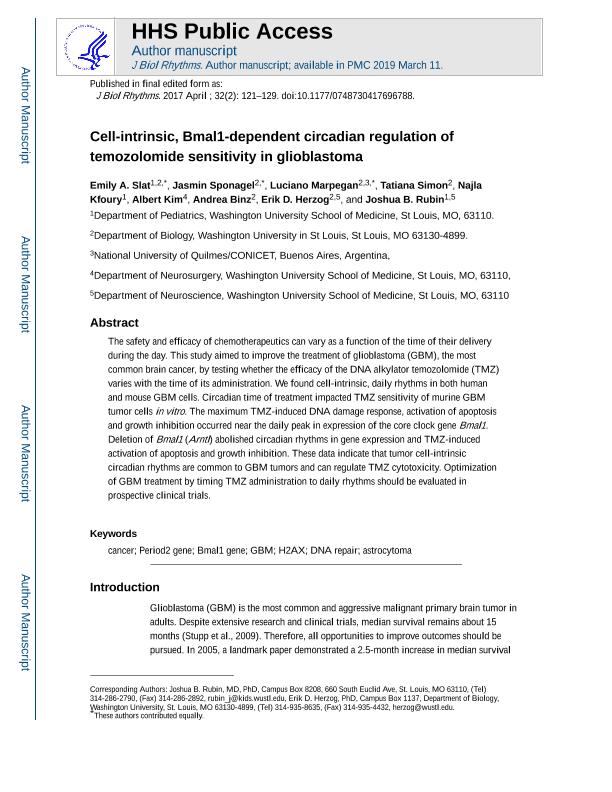Artículo
Cell-intrinsic, Bmal1-dependent Circadian Regulation of Temozolomide Sensitivity in Glioblastoma
Slat, Emily A.; Sponagel, Jasmin; Marpegan, Luciano ; Simon, Tatiana; Kfoury, Najla; Kim, Albert; Binz, Andrea; Herzog, Erik D.; Rubin, Joshua B.
; Simon, Tatiana; Kfoury, Najla; Kim, Albert; Binz, Andrea; Herzog, Erik D.; Rubin, Joshua B.
 ; Simon, Tatiana; Kfoury, Najla; Kim, Albert; Binz, Andrea; Herzog, Erik D.; Rubin, Joshua B.
; Simon, Tatiana; Kfoury, Najla; Kim, Albert; Binz, Andrea; Herzog, Erik D.; Rubin, Joshua B.
Fecha de publicación:
03/2017
Editorial:
SAGE Publications
Revista:
Journal of Biological Rhythms
ISSN:
0748-7304
Idioma:
Inglés
Tipo de recurso:
Artículo publicado
Clasificación temática:
Resumen
The safety and efficacy of chemotherapeutics can vary as a function of the time of their delivery during the day. This study aimed to improve the treatment of glioblastoma (GBM), the most common brain cancer, by testing whether the efficacy of the DNA alkylator temozolomide (TMZ) varies with the time of its administration. We found cell-intrinsic, daily rhythms in both human and mouse GBM cells. Circadian time of treatment affected TMZ sensitivity of murine GBM tumor cells in vitro. The maximum TMZ-induced DNA damage response, activation of apoptosis, and growth inhibition occurred near the daily peak in expression of the core clock gene Bmal1. Deletion of Bmal1 (Arntl) abolished circadian rhythms in gene expression and TMZ-induced activation of apoptosis and growth inhibition. These data indicate that tumor cell-intrinsic circadian rhythms are common to GBM tumors and can regulate TMZ cytotoxicity. Optimization of GBM treatment by timing TMZ administration to daily rhythms should be evaluated in prospective clinical trials.
Palabras clave:
Bmal1 Gene
,
Dna Repair
,
Gbm
,
H2ax
Archivos asociados
Licencia
Identificadores
Colecciones
Articulos(SEDE CENTRAL)
Articulos de SEDE CENTRAL
Articulos de SEDE CENTRAL
Citación
Slat, Emily A.; Sponagel, Jasmin; Marpegan, Luciano; Simon, Tatiana; Kfoury, Najla; et al.; Cell-intrinsic, Bmal1-dependent Circadian Regulation of Temozolomide Sensitivity in Glioblastoma; SAGE Publications; Journal of Biological Rhythms; 32; 2; 3-2017; 121-129
Compartir
Altmétricas



